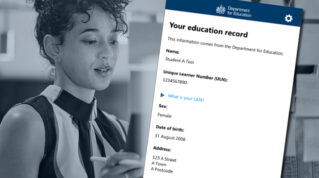Exam board AQA has confirmed it will once again return just 26 per cent of entry fees paid this year after saving £45 million.
In a statement today the board said it was returning all of the money it saved to schools “because, as we’ve always said, we’d never want to benefit financially from the changes to how qualifications are being awarded this summer”.
It comes after formal exams were cancelled for the second year running, with teacher assessment grades due to be issued instead and exam boards performing an external quality assurance process.
“We can now confirm that we’ve saved £45 million this summer, so we’ll be returning all of this to schools and colleges. This means we’ll be refunding 26 per cent of the entry fees paid,” AQA said today.
This is the same proportion of fees refunded by the exam board, which is England’s largest provider of academic qualifications, following the cancellation of exams in 2020. It comes after WJEC Eduqas confirmed last month it would discount fees by 42 per cent.
A survey by leadership union ASCL last month found two thirds of headteachers believed schools should get back at least 75 per cent.
Heads brand rebate ‘unacceptable’
ASCL’s general secretary Geoff Barton called the 26 per cent rebate “completely unacceptable”, saying it fails to reflect the fact schools and colleges have done “the lion’s share of the work” assessing grades.
But AQA’s chief executive Colin Hughes accused ASCL of “misrepresenting the amount of work exams boards have had to do”.
“ASCL know very well that a 75 per cent refund would bankrupt us and mean there wouldn’t be any exams next summer for the young people who are working so hard to prepare for them.”
Jonny Uttley, CEO of the TEAL Trust, tweeted that the rebate was a “joke” given AQA’s finances.
AQA has previously said its finances were “strong and stable” going into the pandemic, with its most recent accounts showing it was sitting on £119.9 million in reserves at the end of last March.
It has generated a cash surplus for the past three years, including a net profit of £24.7 million in 2019-20. The accounts say reserves “ensure that the charity can operate as a going concern in the future”.
Last year AQA predicted it would end 2020-21 with a small deficit as a result of Covid, however, highlighting falling non-exam income and extra costs. But it said the pandemic’s financial impact was “not as great as many other organisations”, with no plans for major cost-cutting.
AQA today pointed out that “as a charity, any income we make gets invested back into qualifications and assessment”.
“This income enables us to keep operating now and in the future – and ensures that every student studying for an AQA qualification will be able to complete it and receive a result.
“So, while we haven’t kept anything we don’t need, we have to make sure we’ve got enough money to cover our costs. And the arrangements for this year have meant we’ve had to do more work than last year, so sadly we haven’t made as many savings as some have suggested.”
Exam board says bigger refund would mean ‘huge’ financial losses
AQA said fees had covered costs including collecting grades and “supporting schools and colleges through the process”, carrying out a “complex and completely new quality assurance process” and preparing for an autumn series of exams.
But Barton said the added expectation that schools use the rebate to fund autumn exams, confirmed earlier this week, “adds insult to injury”, and is “effectively recycling the money back to the exam boards”.
“Schools and colleges have been dumped on time and time again following the cancellation of public exams and the inadequacy of this rebate simply rubs salt in the wound.”
A spokesperson for the exam board OCR said it would also confirm its rebates “as soon as we can” this month.
He said OCR had always planned to pass back savings, but added: “Although we’re a not for profit organisation, we need to cover the costs involved in helping students to progress to their next phase and we’re investing substantial resources in IT systems, delivering assessment materials and guidance, in online training sessions, and in running quality assurance checks.”
















Your thoughts